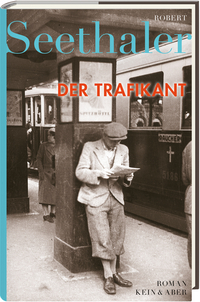Karsten W. reviewed Der Trafikant by Robert Seethaler
Auftragsarbeit?
2 stars
I read the book because Robert Seethaler was recommended to me, and in the book store this book had the most appealing blurb. Wien, Freud, the time just before the Nazis came to power in Austria.
Sometimes I wonder what I would do if I would have lived in the pre-Nazi time. Would I be a conformist? Would I close my eyes? Would I stand up? It is really hard to say, and the book did not bring me on a mental journey to figure that out. Or did I simply not get the main character? Why does he lie to his mother about Trnskie? Why does Franz suddenly decide to place Trnskie's trousers on the flagpole in the center of the city? This comes completely out of the blue, I mean, he does exactly what his "friend" Freud says to do. There is no explanation, no inner dialog …
I read the book because Robert Seethaler was recommended to me, and in the book store this book had the most appealing blurb. Wien, Freud, the time just before the Nazis came to power in Austria.
Sometimes I wonder what I would do if I would have lived in the pre-Nazi time. Would I be a conformist? Would I close my eyes? Would I stand up? It is really hard to say, and the book did not bring me on a mental journey to figure that out. Or did I simply not get the main character? Why does he lie to his mother about Trnskie? Why does Franz suddenly decide to place Trnskie's trousers on the flagpole in the center of the city? This comes completely out of the blue, I mean, he does exactly what his "friend" Freud says to do. There is no explanation, no inner dialog (about this), nothing.
Also I was interested in learning something new about Sigmund Freud. Little of his work is well-received nowadays. But the book gives almost nothing on Freuds work, Seethaler uses him just as a prominent example. I think it is missleading to believe that Freud was in any way similar to the person Seethaler describes.
All in all, nothing new, nothing challenging, nothing out of the ordinary. It is well written though, has reoccurring elements like the doves or the associations with the rural life as a child. It has some wit. It is not monotone. But all that craft does not help since Seethaler has nothing to say.
To be frank, this book feels like a commissioned work: the Nazi theme, antisemitism, love, coming of age -- all nicely packaged and easy to read. An engineered smash hit.

